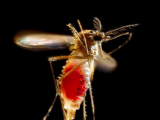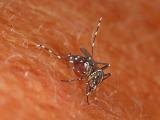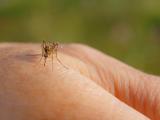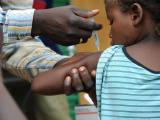Mar 3, 2004 (CIDRAP News) In the face of a possible risk of birth defects, federal health officials are recommending careful evaluation of infants born to women with a history of West Nile virus (WNV) illness during pregnancy.
The recommendation was prompted by a 2002 case in which a woman who had WNV encephalitis during her 27th week of pregnancy gave birth to a full-term baby with chorioretinitis, brain damage, and laboratory evidence of WNV infection, the Centers for Disease Control and Prevention (CDC) reported last week. The report is in the Feb 27 issue of Morbidity and Mortality Weekly Report.
The 2002 case didn't prove a causal connection between WNV and the congenital abnormalities, the CDC said. Three other babies born to mothers with WNV infection in 2002 appeared normal and tested negative for the virus, but cranial imaging studies and eye exams were not done.
The CDC said the risk of intrauterine transmission of WNV and the range of abnormalities that could result are unknown. To find answers, the agency is gathering data on pregnancy outcomes for about 70 women with WNV illness during pregnancy.
Further, in December 2003 the CDC held a meeting of specialists in evaluating congenital abnormalities. The specialists decided that evaluation of babies born to women who had WNV during pregnancy should include the following:
- A thorough physical examination
- Evaluation for neurologic abnormalities, malformations, splenomegaly, hepatomegaly, and rash or other skin lesions
- Serum testing for IgM and IgG antibody to WNV
- A hearing test
- Pathologic examination of the placenta, if possible, and preservation of the placenta, a sample of umbilical cord tissue, and a sample of serum from the umbilical cord for further evaluation in case WNV infection is identified or strongly suspected
If the above steps reveal any abnormalities, additional tests and evaluations are recommended, the report says.
The CDC also said that pregnant women who live in an area with WNV cases and have meningitis, encephalitis, acute flaccid paralysis, or unexplained fever should be tested for WNV. If the infection is found, a careful ultrasound examination of the fetus for structural abnormalities should be considered, the report says. The agency also said clinicians are encouraged to report cases of WNV in pregnant women to their state or local health department or the CDC.
CDC. Interim guidelines for the evaluation of infants born to mothers infected with West Nile virus during pregnancy. MMWR 2004;53(7):154-7 [ Full text]



















